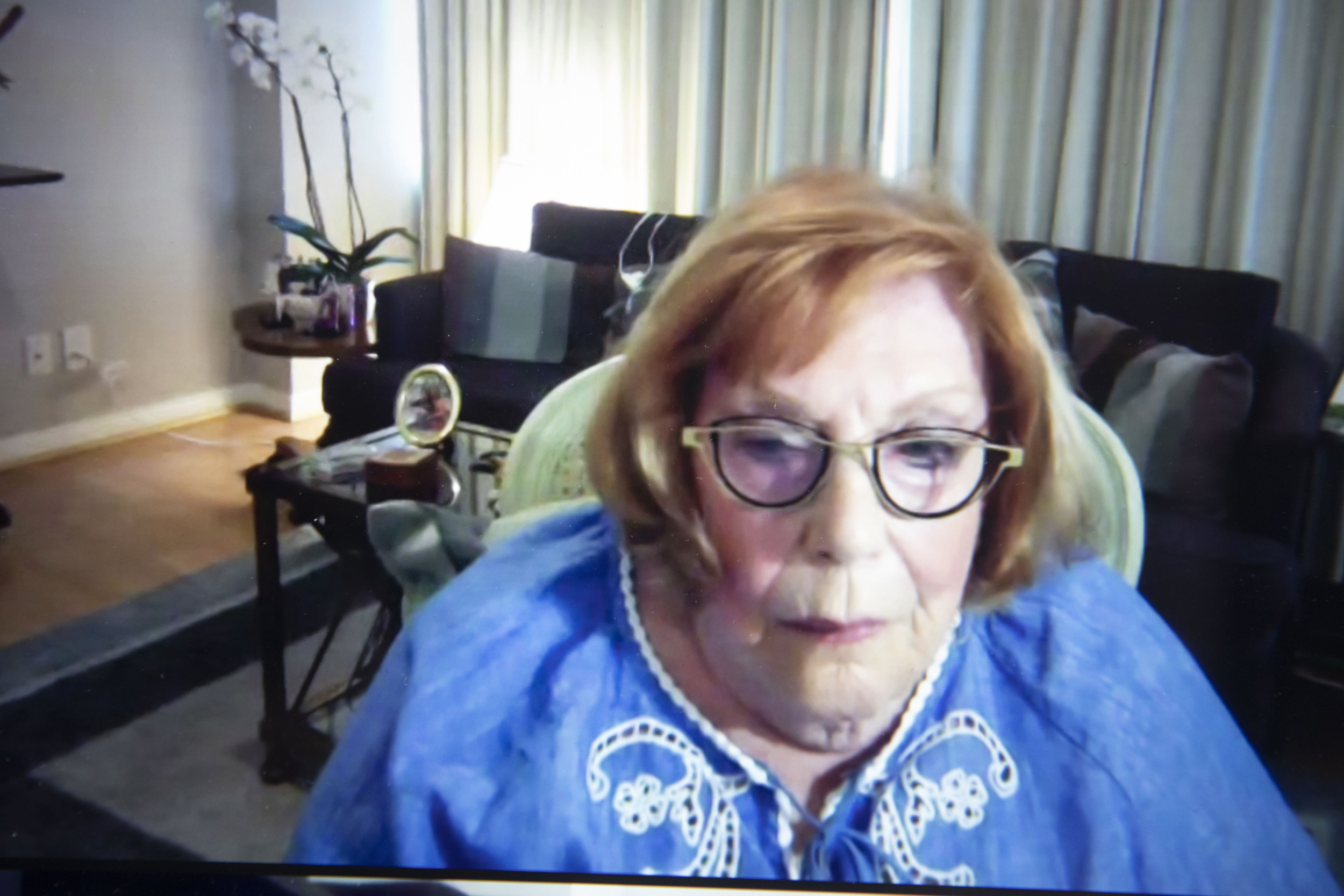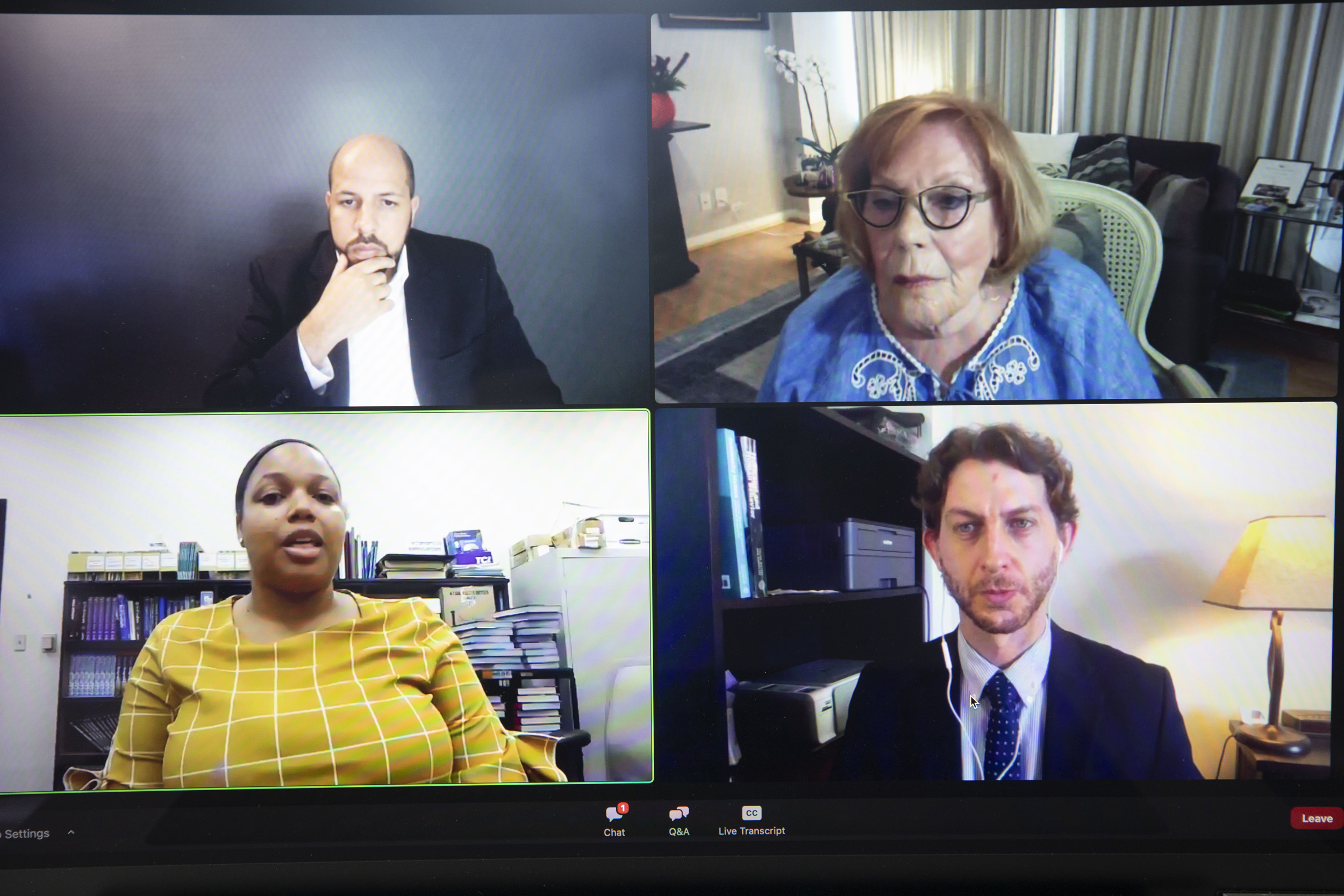
Ruth Steinfeld, a child survivor of the Holocaust, said she shares her story to honor the 1.5 million children murdered during the Nazi regime.
Photos by Kris Snibbe/Harvard Staff Photographer
Lessons in hate from the Holocaust to Buffalo
Ed School event was to focus on learning from past. Speakers say recent killings show how much it’s needed now
Monday’s online discussion was titled “Combatting Hate by Teaching the Holocaust and Other Hard Histories,” and Bridget Long, dean of the Harvard Graduate School of Education, noted how desperately needed those lessons are.
On Saturday, a white 18-year-old gunman dressed in body armor and carrying an assault-style rifle shot 13 people in a supermarket in Buffalo, N.Y., killing 10. Eleven of the shooting victims were Black. The attacks are just the latest in a series of hate crimes in the country in recent years.
Long said the effects of the Holocaust “still reverberate today, not only in the Jewish community, but everywhere, and we should never, never, ever forget the horror of those acts, but importantly know that hate still exists today, and it can touch all of us.”
“We cannot sit silently by,” Long added. “We need to know our history and to confront the fact that evil exists, and it thrives when good people do nothing. We must all condemn hate in the strongest possible terms and work at both individual and national and international levels to confront this malice.”
The afternoon event, part of the School’s Askwith Education Forum series, focused on “the power of personal narrative and personal identity as a tool for teaching and understanding history,” and featured cast members from the 2021 documentary “Undeniable: The Truth to Remember.” The film follows Holocaust survivors as they share their stories with a group of Texas high school students.
“We need to know our history and to confront the fact that evil exists, and it thrives when good people do nothing.”
Bridget Long, Harvard Graduate School of Education dean
The project began as an attempt to “educate people about the terrible tragedy of the Holocaust,” said the film’s producer Tom Werner, who is also the chairman of the Boston Red Sox. Werner echoed Long’s comments, noting that hate crimes “still exist today,” and said the Buffalo shooter’s racist manifesto could have been lifted from “Mein Kampf,” Adolf Hitler’s 1925 autobiography tracing the evolution of his antisemitic and racist ideology, which would later be embraced by the Nazi Party.
Lamenting the fact that “the Holocaust is probably not taught in the majority now of high schools in America,” Werner said education is “the most powerful way you can combat hate crimes.”

One person helping educate younger generations is Ruth Steinfeld, a child survivor of the Holocaust who features prominently in Werner’s film and who took part in the panel. Born in Germany in 1933, Steinfeld was sent to Gurs, a concentration camp in southwestern France, with her sister and parents when she was 7. A French aid agency helped smuggle the children to safety, but Steinfeld never saw her mother or father again. Decades later she learned they had both been killed at Auschwitz. Today she shares her story, she told the audience, to honor them and the staggering number of children murdered during the Nazi regime.
“When I found out what happened to my parents, I made a silent decision that I will not let it happen, that the world will know what actually did happen, that 1.5 million children were murdered. And to me that is of utmost importance, to let the world know not to let this happen ever again,” said Steinfeld. “We know that in many places, a lot of this is happening. And we need to keep talking about it.”
The film captures Steinfeld speaking to Laporche Abram’s history class at Hastings High School in Houston. Abram, who took part in the panel during a lunchtime class break, said Steinfeld’s visit helped her students connect her story of struggle and survival “in one way or another with their own personal stories.”
Daniel Braunfeld, associate program director of special projects for Facing History and Ourselves, a nonprofit using “lessons of history to challenge teachers and their students to stand up to bigotry and hate,” said stories from the past can help students better understand empathy, motivations, inspirations, and consequences of people’s everyday choices, and the decisions students they make in their own lives.
“[History] provides a little bit of arm’s length for students to be able to wrestle with these questions about how people treat each other, engage in processes, what are the impacts of ideologies,” said Braunfeld, “so they can begin to recognize their agency in the present.”
In her class, Abram asks her students to study the personal narratives of children who experienced the Holocaust and to keep their own diaries. For the past two years the teens have chronicled their lives during the pandemic, she said, writing about school closures or losing a loved one. By comparing their own experiences to those of the children who suffered during World War II, Abram said they feel “that empathy” and are better able to understand “what these particular groups of individuals were going through.”
“I think that that’s important because once we’re able to make those connections, and they’re able to find something that they can relate to … they then become invested in wanting to learn more.”
Moderator Eric Shed, a lecturer on education at HGSE, asked Steinfeld what the world still needs to learn from the Holocaust and from her own experience. “What the world has experienced is 6 million Jewish people died for no reason other than someone decided that we were not welcome in this world, my parents included,” she answered. “What we need to learn is that we’re all created equally.”




